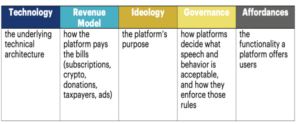Category Archives: Media
Healthy Social Media? Experts Weigh In
Vermont’s own example of “Small Tech,” Front Porch Forum, drew several mentions this past week as the antithesis of Facebook and other destructive Big Tech.
Michelle Goldberg stated in the New York Times:
“Deb Roy, director of the M.I.T. Center for Constructive Communication and former chief media scientist at Twitter,… believes that the potential for a healthy social media exists — he points to Front Porch Forum, the heavily moderated, highly localized platform for people who live in Vermont. But it’s notable that his best example is something so small, quirky and relatively low-tech. Sure, there are ways of communicating over the internet that don’t promote animosity, but probably not with the platforms that are now dominant.“
While Jason Kelley and Danny O’Brien at the Electronic Frontier Foundation shared…
“[FPF] users say that while most of the internet ‘is like a fire hose of information and communication, Front Porch Forum is like slow drip irrigation.’ While many of the most popular social networks need to scale to perform for investors, which relies on moving fast and breaking things, Front Porch Forum could be described as a site for moving slowly and fixing things.”
And civic tech expert Micah Sifry said in his SubStack newsletter The Connector…
“Ian Bogost makes a good argument in The Atlantic for legislators or regulators setting speed and volume limits on sites like Facebook. Getting the tuning right won’t be simple, but in the same way that we’ve come up with safety rules for all kinds of products, we need them for social media. I’d start by looking at what has worked for a platform like Front Porch Forum, and try limiting the size of people’s ‘friend’ lists and the speed of comments.”
FPF to Speak on Panel: Reimagine the Internet
Front Porch Forum‘s co-founder, Michael Wood-Lewis, will speak on a panel for the virtual conference, Reimagine the Internet, on Thu., May 13 at 12:00 p.m. The event is co-hosted by the Knight First Amendment Institute at Columbia University and the soon-to-be-launched Initiative on Digital Public Infrastructure at the University of Massachusetts, Amherst.
FPF will be joined by many notable panelists, including Cory Doctorow of Electronic Frontier Foundation, Evelyn Douek of Harvard Law School and Katherine Maher of Wikimedia Foundation.
Front Porch Forum will be part of Thursday’s discussion:
Lessons from Experiments in Local Community-Building
Thursday, May 13, 2021
12:00 p.m. – 1:30 p.m.
This panel will focus on lessons learned from local communities and the implications of these lessons for online spaces. Sara Lomax-Reese is the CEO of WURD, a family-owned talk radio station in Philadelphia that serves that city’s Black community. Michael Wood-Lewis is co-founder of Front Porch Forum, an online community of mailing lists that serves every town in Vermont. Individually and in dialog, both will address lessons learned in building hyperlocal media and the ways in which online communities build trusted relationships.
Panelists
- Sara Lomax-Reese, WURD Radio
- Michael Wood-Lewis, Front Porch Forum
Moderator
- Ethan Zuckerman, Initiative on Digital Public Infrastructure at the University of Massachusetts, Amherst; Knight First Amendment Institute at Columbia University
Learn more about the virtual conference or RSVP here.
Vermonters take notice of FPF in the News
Front Porch Forum is celebrating the start of spring and lots of mentions in the news recently which our members have noticed!
“A big shout out to let everyone know that the April issue of The Atlantic has an excellent article called The Internet Doesn’t Have To Be Awful. This article mentions our fantastic Vermont FPF as an example of how we can make the internet a space that promotes democratic values by helping to make conversations better to benefit everyone in a community.” • Sandy in Burlington

How to Put Out Democracy’s Dumpster Fire
By: Story by Anne Applebaum and Peter Pomerantsev
Instead of making people angry, participation in online forums can give them the same civic thrill that town halls or social clubs once did. “Elks Club meetings were what gave us experience in democracy,” he said. “We learned how to run an organization. We learned how to handle disagreement. We learned how to be civilized people who don’t storm out of an argument.”
Versions of this idea already exist. A Vermont-based site, Front Porch Forum, is used by roughly a quarter of the state’s residents for all sorts of community activity, from natural-disaster response to job-hunting, as well as civic discussion. Instead of encouraging users to interact as much and as fast as possible, Front Porch slows the conversation down: Your posts come online 24 hours after you’ve written them. Sometimes, people reach out to the moderators to retract something said in anger. Everyone on the forum is real, and they have to sign up using real Vermont addresses. When you go on the site, you interact with your actual neighbors, not online avatars.
Read the full article here.
“Kudos! FPF is showcased in the Atlantic. Upon which Fareed Zakaria (Foreign Affairs Quarterly, Global Public Square) highlighted FPF in his Global Briefing newsletter, “Can Online Politics Be Fixed?” • Alison in Burlington

Can Online Politics Be Fixed?
Insights, analysis and must reads from CNN’s Fareed Zakaria and the Global Public Square team, compiled by Global Briefing editor Chris Good
In Vermont, a site called Front Porch Forum “is used by roughly a quarter of the state’s residents for all sorts of community activity, from natural-disaster response to job-hunting, as well as civic discussion,” Applebaum and Pomerantsev write. “Instead of encouraging users to interact as much and as fast as possible, Front Porch slows the conversation down
See the full newsletter here.

9 Projects Trying To Build Social Platforms That Don’t Make You Hate Yourself
By: Jeff Link
Now in its third software iteration, Front Porch Forum is a community-based forum where neighbors can share information and local concerns. Active in Vermont and parts of New York, the 20-year-old platform launched by Michael and Valerie Wood-Lewis trades in short posts about locally relevant topics lost pets, cars for sale, plumber recommendations, school budget issues and political protests. The service hosts online neighborhood and small-town forums for registered users.
“Once a day they’ll get an issue that arrives via email or website or mobile app,” Wood-Lewis said of users. “The average issue might have about 10 postings. It’s not emoticons. It’s not LOL-type stuff. It’s more substantive. The most compelling content tends to gravitate toward the top.”
“There’s no anonymity. It’s like wearing a name tag and showing up at a block party with your neighbors.”
Open only to local citizens, officials, nonprofits and businesses, the platform is distinct from several of its larger social-networking competitors.
“There’s no anonymity. It’s like wearing a name tag and showing up at a block party with your neighbors,” Wood-Lewis said during the panel discussion.
In addition, every posting is reviewed by a staff of online community managers before publication.
Read the full article here.
![]()
Virus in Vermont: In mutual aid groups, people help one another
By: Nora Peachin
Michael Wood-Lewis, co-founder of Front Porch Forum, says local communities have been weakened as life has moved online, a trend he has been trying to reverse with Front Porch Forum a community bulletin board since its founding in 2006.
“It would be my fondest wish that the social capital, those connections created in [mutual aid] work, don’t dissipate with the crisis,” Wood-Lewis said. “I hope all those mutual aid groups continue to live on, even if only as a social entity so that people can keep those connections in this time of political divisiveness and with all that big tech has foisted on us.”
Wood-Lewis noted a dramatic increase in almost all of Front Porch Forum’s metrics new members, postings, advertisers, clicks on ads during the pandemic. Wood-Lewis’ team set up a special category for mutual aid groups in the online directory and a list of ways to help during Covid.
Read the full article here.
Stay in tune with all the latest FPF mentions on our media page.
Welcome to Vermont
From maple creemee tours to swimming holes, farmers markets to local writers, there’s plenty of hidden gems that any new Vermont resident simply must check out. One perfect example is the locally grown VPR podcast, Brave Little State; it will tell you all you need to know about making your home in the Green Mountain State! We think their tip about joining FPF is especially good 🙂
FPF on Reimagining the Internet
Front Porch Forum‘s Co-founder, Michael Wood-Lewis, joined Ethan Zuckerman of Reimagining the Internet for an interview on running a healthy online community. Reimagining the Internet is a podcast that talks to experts in the field about what isn’t working with social media and how it can be improved. Jimmy Wales, the founder of Wikipedia, was also a recent guest of the podcast.
Give this great interview a listen!
For more on FPF check out FPF in the news!
Front Porch Forum Expands Staff to Meet Growth
 Burlington, VT, February 3, 2021 — Front Porch Forum now has 200,000 members! This recent membership milestone indicates FPF is serving 75% of the state’s 260,000 households, and more Vermonters sign up every day.
Burlington, VT, February 3, 2021 — Front Porch Forum now has 200,000 members! This recent membership milestone indicates FPF is serving 75% of the state’s 260,000 households, and more Vermonters sign up every day.
In recognition of this growth, FPF expanded its team of Online Community Managers. We welcome new hires, Emily Bissonette and Zach Scheffler, who will help the organization fulfill its mission of helping neighbors connect.
As part of FPF’s 22 staff members, our Online Community Managers (OCMs) play a crucial role in reviewing and publishing many thousands of member postings each week, and providing member support.
Zach says of his new role “It’s a joy and an honor helping Vermonters inform, inspire, and look out for one another.”
Zach has a background in community media and municipal information services. Outside of Front Porch Forum, Zach enjoys a brisk hike, photography, and woodworking.
Emily joined the OCM team in September 2020. “I really enjoy the collaborative work environment at FPF. I’m originally from Vermont and I am also really enjoying being more informed about what’s going on in our state through my FPF work,” she said of her work.
Emily resides in Middlebury with her sweetheart, and kiddo, and a miscellaneous menagerie including a dog, a cat, chickens, and various waterfowl. She is the only Marie Kondo Certified Professional Organizer in Vermont, and when she’s not at work for Front Porch Forum, she focuses on business, Alchemy Organizing or teaching REFIT® dance fitness.
Front Porch Forum is an award-winning Vermont Public Benefit Corporation. Our mission is to help neighbors connect and build community, leading to more resilient communities. FPF hosts regional networks of online local forums where neighbors, small businesses, nonprofits and municipal officials post about a wide variety of topics. This daily neighborly exchange leads to people feeling more invested in their communities and getting more involved.
Looking Back to 14 Years Ago

The staff at FPF was touched to rediscover this 2006 Seven Days article titled “Front Porch Forum Encourages Neighborliness — Online and Off.” It’s heartening to see how far Front Porch Forum has come over 14 years.
The article explains how FPF got started. At the time it was written, co-founder Michael Wood-Lewis compiled e-newsletters alone.
“Though Wood-Lewis is currently working on FPF as a volunteer, he sees his time as an investment. He’s hoping that as the service expands, he’ll be able to find local businesses to sponsor it.”
Now the organization has a growing staff of 22. It’s been put to use in communities all over the state, and now serves parts of New York and Williamstown, Massachusetts. The look and feel of the Email Forum has been redesigned and members can now also read their Forum via mobile app and the website.
Check out the full piece for an awesome throwback (complete with a MySpace reference!)
“Local Logic: It’s Not Always a Beautiful Day in the Neighborhood”
 Technology and the way people use it has the power to unite people or pull them apart. Ethan Zuckerman and Chand Rajendra-Nicolucci of Knight First Amendment Institute at Columbia University took a closer look at platforms that bring communities together on a local level, only to find that some designs work better than others.
Technology and the way people use it has the power to unite people or pull them apart. Ethan Zuckerman and Chand Rajendra-Nicolucci of Knight First Amendment Institute at Columbia University took a closer look at platforms that bring communities together on a local level, only to find that some designs work better than others.
Platforms that operate more like social media, where individuals can post whatever they want instantaneously, can lead to heated, attacking commentary, false accusations, or misinformation. This kind of content may cause civil discourse to devolve and it may disrupt the establishment of ties within a community.
On the other hand, Front Porch Forum is an example of a local platform that has systems in place to help keep conversations civil and community-minded, fulfilling its mission of helping neighbors build community. From Rajendra-Nicolucci and Zuckerman’s piece:
“That organic growth was key to maintaining one of the key differences between FPF and Nextdoor: proactive moderation. FPF uses a team of moderators that review each post to make sure it adheres to the site’s code of conduct (which bars personal attacks and behavior “counter to its community-building mission”) before it’s posted. That helps to keep the discussion friendly and constructive… We believe a platform that takes governance seriously, is designed for a specific purpose, and has ties to the communities it serves can be successful anywhere.”
The authors also share the criteria by which they evaluate various platforms. These platforms operate on a local level broken into neighborhoods, towns, or city blocks.

“Getting local social media right is important. Local platforms present an opportunity to strengthen social capital and civic life. At their best, they can keep residents informed about local issues, encourage civic organizing and action, and facilitate new connections and greater understanding.”
Read the full article on Knight First Amendment Institute at Columbia University’s blog here.
About Blog
Ghost of Midnight is an online journal about fostering community within neighborhoods, with a special focus on Front Porch Forum (FPF). My wife, Valerie, and I founded FPF in 2006... read more
Post Categories
- Uncategorized
- PDF2009
- Calendar
- Northeast Kingdom
- podcast
- Peer Rental
- Localization
- Big Tech
- Events
- PDF2007
- Web Traffic
- Google AdSense
- Pay It Forward
- Elections
- berkmansunlight
- Maps
- Video
- Upstate New York
- Coupons
- Wildlife
- Mobile
- Viral Marketing
- Raffle
- Crisis Response
- Donations
- Lost & Found
- Real Estate
- College Students
- Gratitude
- Social Responsibility
- Orton Family Foundation
- Start ups
- Make It Your Own Awards
- Online Civility
- Clay Shirky
- Newspapers
- Humor
- How To Use FPF
- Online Classified Ads
- Peer Reviews
- Best of FPF
- Politics
- Community Management
- Economic Development
- Local Reviews
- Case Foundation
- Borrow and Lend
- Neighborhood Watch
- Good Government
- Small Business Advertising
- Citizen Journalism
- e-Vermont
- Democracy
- Local Search
- Knight Foundation
- Burlington
- MacArthur Fellows
- Civic Engagement
- Social Media
- social capital
- Social Networking
- Vermont
- Neighborhood
- Community Building
- Local Online
- Front Porch Forum


 Team Tiki in Wolcott organized donations to the Hardwick Area Food Pantry. Blaine, 6, chose the charity. “It was all him,” said mom Laura.
Team Tiki in Wolcott organized donations to the Hardwick Area Food Pantry. Blaine, 6, chose the charity. “It was all him,” said mom Laura.
